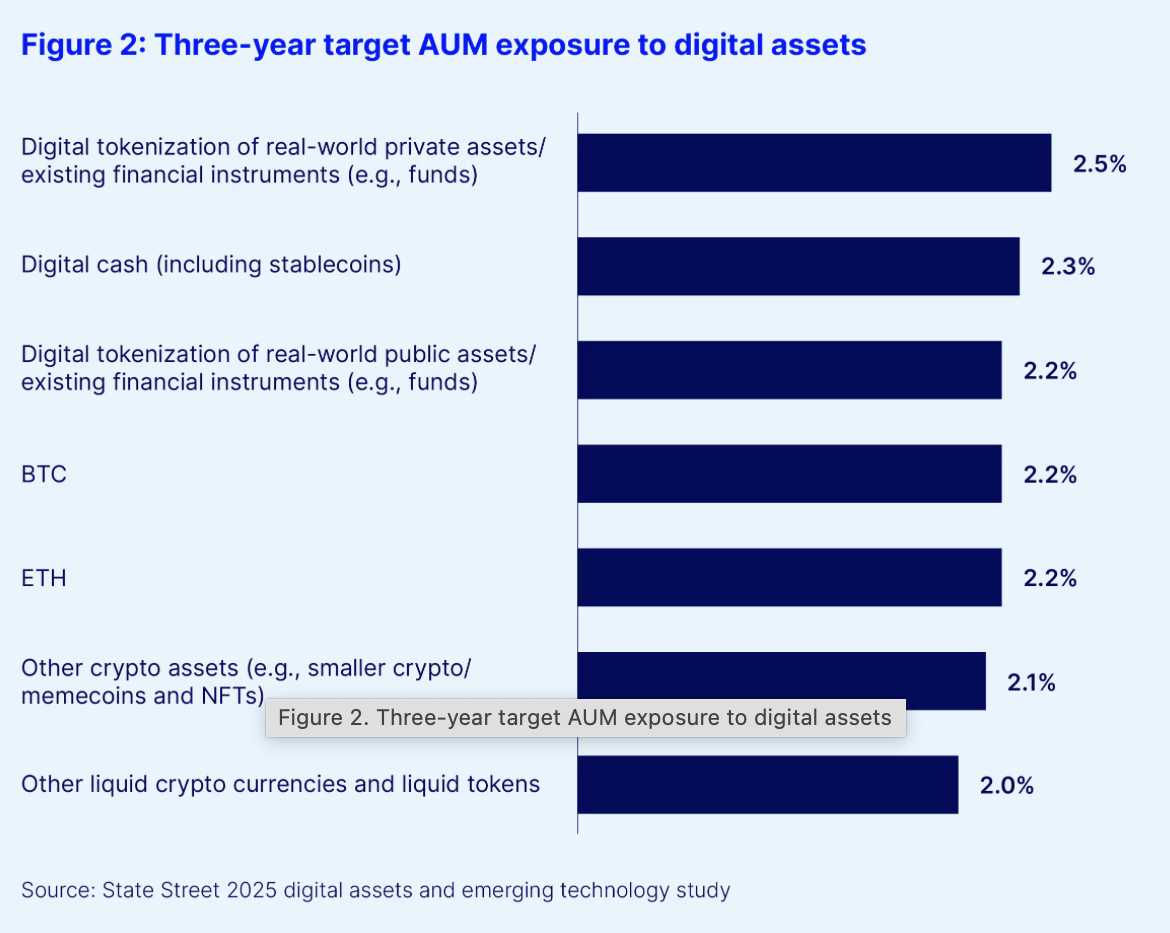
Institutional Investors to Increase Digital Asset Investment to 16% by 2028
A recent survey indicates that institutions are significantly enhancing their digital asset investments, with blockchain and AI technologies playing a pivotal role in this shift despite skepticism around decentralized finance.
Institutional investors are increasing their commitment to digital assets and technologies such as blockchain and AI, as highlighted in a new report by State Street. Despite this growing interest, many institutions remain skeptical about the full integration of decentralized finance with traditional financial systems.
According to the study, digital assets currently constitute approximately 7% of institutional portfolios, with expectations to rise to 16% by 2028.
 State Street
Source: State Street
State Street
Source: State Street
While the majority of investments are in stablecoins and tokenized equities or fixed income (about 1% per asset), cryptocurrencies have proven to yield substantial returns. Notably, Bitcoin was recognized by 27% of respondents as the top performer, followed by Ethereum at 21%.
The report emphasizes that private assets are expected to be the first to benefit from tokenization. Although many institutions anticipate that digital assets will gain mainstream acceptance within the next decade, they are cautious regarding the speed of this adoption.
Around 52% of participants expect that by 2030, 10% to 24% of overall investments will involve digital or tokenized instruments, yet only 1% foresee a complete transition to on-chain investments.
Conducted in collaboration with Oxford Economics, the survey included over 300 institutional investors to explore their utilization of digital assets, AI, and blockchain technologies.
In its capacity as a provider of institutional financial services, State Street Corporation oversees around $49 trillion in assets as of June 30, with approximately $5.1 trillion managed across more than 100 markets.
Related articles: AI-generated content needs blockchain before trust in digital media collapses
Digital Transformation Strategies: AI and Blockchain
The research suggests that both blockchain and artificial intelligence are essential components of the digital transformation strategies implemented by institutions.
Nearly all surveyed firms have either initiated or plan to adopt strategies leveraging advanced technologies to enhance interoperability and streamline business operations.
According to the findings, 29% of respondents view blockchain as critical to their transformation efforts, extending its use beyond investment tasks to areas like cash flow management (61%), data processes (60%), and legal compliance (31%).
Institutions increasingly regard blockchain and generative AI as vital elements of broader digital transformation initiatives. Approximately 45% agreed that advancements in generative AI will expedite digital asset development by enhancing the efficiency and security of creating blockchain networks and smart contracts.
DeFi Meets TradFi in Transition
Despite rising confidence in digital assets, many entities express skepticism regarding the potential for blockchain systems to entirely replace conventional trading and custody frameworks.
Nearly 43% of respondents believe that hybrid systems combining decentralized and traditional finance investments will become predominant within five years, a significant rise from 11% reported a year earlier.
Yet, 14% of those surveyed indicated that they doubt digital investment systems will ever completely replace traditional infrastructure, reflecting a sharp increase from just 3% in 2024.



